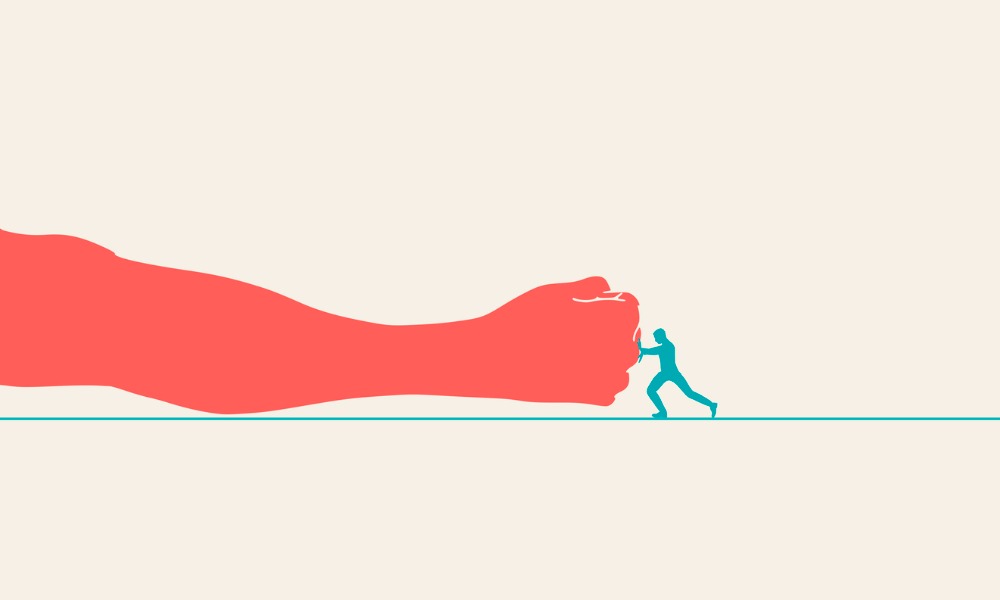
His rhetoric relies on a tried-and-true approach of uniting the majority against minorities

Late last month, in a speech to the Canadian Police Association, Conservative Leader Pierre Poilievre dropped the completely unsurprising bombshell that his government would pass laws violating Canadians' constitutionally protected rights and freedoms.
Poilievre all but promised to use the notwithstanding clause to bulldoze through legislation that would otherwise violate the Charter of Rights and Freedoms. Because, you know, who needs rights when you have power?
"All of my proposals are constitutional, and we will make them constitutional using whatever tools the Constitution allows me to use to make them constitutional," Poilievre told the gathered group of friendly cops.
Translation: "I’ll do whatever it takes to make my dubious ideas seem legit."
Now, Poilievre didn’t exactly spell out what new laws he had in mind, but he’s been playing the tough-on-crime card like it’s going out of style, with a justice policy that mixes simplistic solutions and catchy slogans.
So, what could Poilievre be cooking up? Eliminating bail? Reinstating ineffective minimum sentences? Banning house arrest? Mandating harsh jail conditions? The answer is probably all the above. It’s like a tough-on-crime buffet of bad ideas.
These simplistic solutions are not only ineffective at addressing complex social problems or making our communities safer, but they are also unconstitutional.
Using the notwithstanding clause is basically an admission that your laws are discriminatory. Poilievre's pride in that black mark is disturbing but, sadly, not surprising.
This brand of divisive populism thrives on undermining democratic institutions and opens the door wide for authoritarian abuses of civil liberties.
It’s frighteningly easy to unite the majority by being cruel to minority groups. Poilievre’s new Conservative tactic uses simple policies and common language to pit ordinary people against so-called gatekeeping elites and argues that policies should express the people's will.
Just last week, one of Poilievre’s latest recruits, Jamil Jivani, accused the government of listening to elites, experts, and PhDs over ordinary people when developing policies.
Putting aside Jivani’s Juris Doctor from Yale Law School, it’s still a good idea to talk to experts when dealing with complex policies.
Maybe they didn’t teach Canadian Constitutional law at Yale, but the Charter exists to protect minority rights from the cruel and capricious will of the majority.
Poilievre justified his views on constitutional rights when he addressed the police: "I will be the democratically elected prime minister – democratically accountable to the people, and they can then make the judgments themselves on whether they think my laws are constitutional because they will be."
Yes, because mob rule has always been such a reliable measure of justice and constitutionality.
Remember, the mob used to think discrimination against LGBTQIA2S+ people was perfectly fine. Ordinary Canadians were cool with denying women equal rights and control over their bodies. The public didn’t bat an eye at residential schools and colonial atrocities against Indigenous people. And we could go on because, spoiler alert, most of the public has, and still does, hold some dangerous beliefs.
Recent history shows the danger of being a sucker for Poilievre and Jivani’s brand of populism.
Provincial conservatives have used the notwithstanding clause to override the rights of unionized workers, limit participation in elections, and target religious minorities and transgender and non-binary youth. And let’s not forget that less than 20 years ago, Alberta Conservatives tried to use the clause to enforce an opposite-sex-only definition of marriage.
There’s no reason to believe that Poilievre will stop at violating the rights of accused criminals. His conservative foot soldiers have openly talked about limiting or eliminating medical assistance in dying, shuttering harm reduction initiatives, restricting labour rights, limiting LGBTQIA2S+ rights, and even cutting off access to abortion services.
It’s tempting to look for simple solutions to complex problems, especially when those solutions involve taking rights away from others. But we must reject the allure of simplistic, populist rhetoric and do the hard work of striving for policies that uphold the dignity and rights of all individuals.
Preserving our rights and freedoms is not just about protecting the majority – it’s about ensuring a just and inclusive society for everyone.